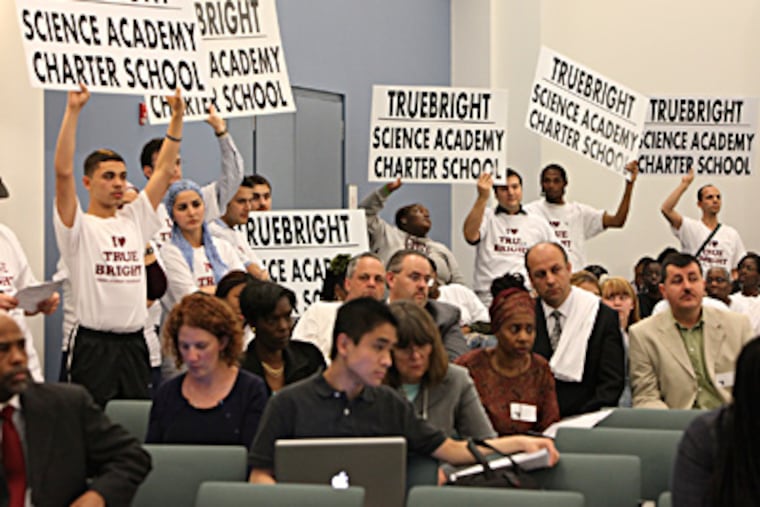SRC begins process to shut 3 charter schools
For the first time in four years, the Philadelphia School Reform Commission on Thursday night began the process of closing city charter schools.

For the first time in four years, the Philadelphia School Reform Commission on Thursday night began the process of closing city charter schools.
The commission voted to put three schools on notice that their five-year operating charters would not be renewed: Truebright Science Academy, Arise Academy, and Hope.
The district's charter-school office had recommended the actions for all three schools based on problems with academics and administration and failing to meet state requirements, such as having 75 percent certified teachers. Arise was also flagged for its financial instability.
The schools will remain open for the 2012-13 academic year.
SRC Chairman Pedro Ramos stressed that the evening's votes were merely the first steps in a lengthy process that includes public hearings and possible appeals to the state Charter School Appeal Board in Harrisburg.
Ramos late Thursday night also announced a controversial new process that delays and changes the game plan for 22 other charters up for renewal this year and the expansion requests of many others.
Commission members said that although Arise's troubled track record did not merit a new, five-year renewal, they expressed interest in working with the school's new board president and CEO to develop a plan with specific performance targets that would allow the school to stay open.
Arise Academy, which opened in 2009, is in Center City and has 181 high school students. It is the nation's first charter for students in foster care, who have a high risk of dropping out of school.
Hope, which opened in 2002, serves 427 ninth through 12th graders on its campus in West Oak Lane. It has small classes and aims to offer a second chance for students who have not fared well in other schools.
Truebright, which opened in North Philadelphia in 2007, has a special focus on science and technology. It has 307 students from seventh through 12th grade.
As The Inquirer has reported, Truebright is one of more than 130 charter schools nationwide run by followers of Turkish Imam M. Fetullah Gulen, who lives in self-imposed exile in the Poconos.
Several federal agencies are looking into allegations of kickbacks from Turkish teachers to the Gulen movement at the charters nationwide, according to knowledgeable sources. One-third of Truebright's teachers and administrators are Turkish, and most of them are working in this country on non-immigrant visas.
At least nine of Truebright's American educators have filed complaints with the U.S. Equal Employment Opportunity Commission, alleging they were paid less than Turkish counterparts who are not certified and who are less qualified.
Truebright officials say the school is independent, not part of any alleged network of Turkish charter schools, and is not under investigation.
During Thursday night's meeting, Truebright's board president, Baki Acikel, and CEO, Bekir Duz, criticized Inquirer articles about Truebright, saying they were unfair and based on "unsubstantiated allegations with little focus on the education students at Truebright receive in a safe, nurturing environment."
Duz issued an "open invitation" for federal authorities to come to Truebright to see its operations for themselves. "We have nothing to hide," he said.
The last time the SRC voted against renewing a charter was in 2008, when the commission gave a thumbs-down to two charters in Northwest Philadelphia: Germantown Settlement and Renaissance Charter School.
After public hearings over several days that summer, the SRC voted to close the schools. The state charter appeals board later upheld the SRC's decisions, and both schools closed in June 2009.
In the current round of renewals, the district's charter-school office had recommended approval for 17 of the 22 other schools and was still reviewing five. Officials from the 17 charters had been expecting the SRC would vote on new five-year operating charters Thursday night.
But in the face of mounting fiscal uncertainty in the district and new legal concerns, the SRC on Thursday night decided to scrap the review process it had used last year for renewals. The new plan focuses on negotiating enrollment caps with the charters, and on recruiting students from neighborhoods with few good education options and from specific schools slated to close.
The SRC said the schools facing renewal would need to submit revised proposals to the district soon. Beginning April 27, the commission will meet Friday mornings through June 30 to consider the charter proposals.
The move riled charter officials.
Ayesha Imani, head of school at Sankofa Freedom Academy, was upset by the SRC's eleventh-hour move. She said the school had spent a year working on a renewal application and done everything the district had asked.
"It places us in limbo," she said. "They're holding our charters hostage based on their financial situation. It's just not fair."
In all, the district has 80 charter schools that enroll nearly 46,000 students.
In a decision that could have a major financial impact, Commonwealth Court ruled earlier this month that the district had violated a 2008 state law when it tried to cap enrollment at the Walter D. Palmer Leadership Learning Partners Charter School.
Ramos said the district likely would appeal.
The district already must cut $26 million in expenses by June 30, and an additional $186 million in the fiscal year that starts July 1.
Inquirer staff writer Kristen A. Graham contributed to this article.